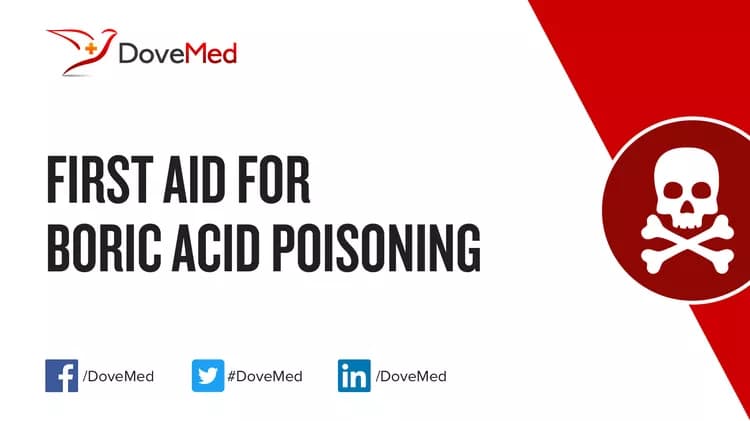What is Boric Acid Poisoning?
- Boric acid is a chemical compound with a wide variety of industrial and domestic applications. It commonly forms an ingredient of many pesticides (against insects, weeds, fungi, etc.) and certain wood preservatives
- Preparations, based on boric acid, are used medically as an antibacterial and antifungal agent; for treating minor cuts, bruises, and burns, including in the prevention of athlete’s foot and candidiasis
- Boric Acid Poisoning is the accidental or intentional intake of any product containing the compound
- The condition is diagnosed based upon the clinical history, combination of signs and symptoms, and additional tests (that may include, in some cases, radiological studies and laboratory tests)
Boric Acid Poisoning may be also referred to as Borax Poisoning and Boric Acid Toxicity.
What are the Causes of Boric Acid Poisoning?
- Boric Acid Poisoning is caused by intake or ingestion of boric acid compounds
- This intake could be accidental, or in some cases intentional, to bring self-harm
- The compound may be in the form of antiseptic powders and creams, topical lotions, insecticides, pesticides, paints and enamels, preservatives, and eye wash products
Note: The compound can interact with other prescribed or non-prescribed medications in the body. Such interactions may enhance the therapeutic effects of other medications being taken, resulting in undesired side effects.
What are the Signs and Symptoms of Boric Acid Poisoning?
The signs and symptoms of Boric Acid Poisoning can vary from one individual to another. It may be mild in some and severe in others. Several systems of the body may be affected. Infants and young children may be severely affected.
The common signs and symptoms of Boric Acid Poisoning may include:
- Red skin rashes
- Diarrhea
- Vomit that is blue-green in color
Other symptoms may include:
- Urinary difficulties; reduced urine production
- Nausea, vomiting
- Increased heart-rate
- Reduced blood pressure (hypotension)
- Lethargy and weakness
- Disorientation, low level of alertness
- Seizures
- Blisters on the skin; peeling of skin
- Fever
- Collapse and coma
How is First Aid administered for Boric Acid Poisoning?
First Aid tips for Boric Acid Poisoning:
- Call 911 or your local emergency help number immediately, for emergency assistance
- Call the Poison Control Center at 1-800-222-1222 (or your local poison control center) for further instructions
- Provide them with information such as the compound taken, quantity and time of ingestion, age, weight and general health status of affected individual
- Confirm that the airways are protected; also, ensure breathing and the presence of pulse
- If skin exposure or involvement of the eye has occurred, then wash thoroughly with copious amounts of water (for at least 15 minutes)
- Take individual to emergency room (ER) for further treatment
- Always try to take the compound bottle/container to the ER
The emergency medical health professional might perform the following steps towards treating the condition:
- Medically manage symptoms, such as abnormal heart rate and seizures
- Provide breathing support, if necessary
- Wash skin and eyes repeatedly and thoroughly (irrigation), to eliminate any remaining hazardous compound
- Administer fluids by an intravenous drip line
Who should administer First Aid for Boric Acid Poisoning?
First aid for Boric Acid Poisoning is administered by healthcare professionals.
- The individual who is affected, or someone near, should call 911 for emergency assistance (or the local emergency number)
- They should also call the poison control center at 1-800-222-1222 (or the local poison control center) and follow instructions
What is the Prognosis of Boric Acid Poisoning?
- The prognosis of Boric Acid Poisoning is dependent on the amount of substance consumed, time between consumption and treatment, severity of the symptoms, as well as general health status of the patient
- If the individual can recover from the symptoms, with appropriate medication and support, the outcome is generally good
- In case of severe symptoms including abnormal heart rates, seizures, and coma, it may considerably worsen the outcome. The death rate in infants and very young children is reported to be high
- Currently, the use of boric acid in medicinal preparations is on the decline (it is avoided in products used for children)
In general, toxicities are common situations in the emergency departments. A majority of the cases are often not fatal, when appropriate treatment is given.
How can Boric Acid Poisoning be Prevented?
Boric Acid Poisoning can be prevented by:
- Talking to your healthcare provider about the recommended dose of boric acid preparations
- Refrain from self-medication
- Always follow instructions for usage of any health or cosmetic products
- Keeping cosmetics, medications, and other healthcare products out of reach of children in child-proof containers
- Keeping poisonous/hazardous chemicals and other materials out of children’s reach
- Wearing appropriate protective wear when working with such chemicals
- Be aware of basic first aid steps in case of an emergency (such as inadvertent poisoning)
It is important to give your healthcare provider a complete list of prescription and non-prescription medications that are being currently taken. This will help them in assessing the possible drug interactions within various medications and help avoid/prevent accidental or unintentional toxic drug effects.
What are certain Crucial Steps to be followed?
- Call 911 (or your local emergency number) for emergency assistance, if symptoms are life-threatening
- Call Poison Control Center at 1-800-222-1222 (or the local poison control center) and follow the recommend steps
- It would be helpful if the following information is readily available:
- Type, amount and time of consumption of the substance
- Age and weight of the individual
- And, the overall health status of the individual
Related Articles
Test Your Knowledge
Asked by users
Related Centers
Related Specialties
Related Physicians
Related Procedures
Related Resources
Join DoveHubs
and connect with fellow professionals


0 Comments
Please log in to post a comment.